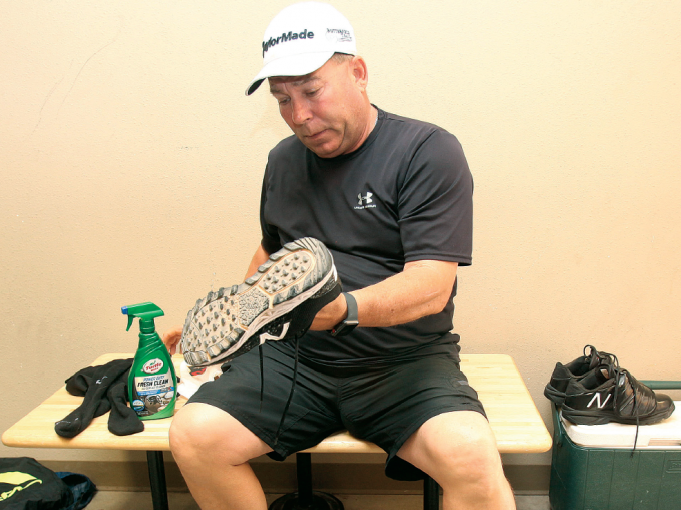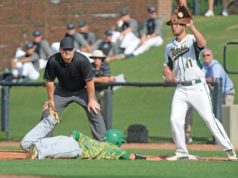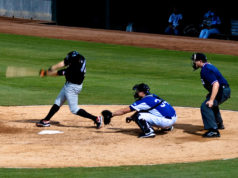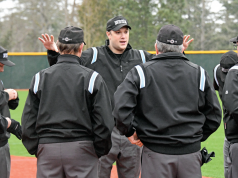For those lucky enough to be chosen for postseason assignments, it’s a reward for a job well done during the season. But there can be pitfalls. Most umpires do what they should — keep a low profile and behave on and off the field — but I’ve seen some do or say something stupid that could have, or did, wreck their future chances.
Rule No. 1 is based on the old expression, “When in Rome, do as the Romans do.” Every tournament has a structure with designated people calling the shots. You may not like how things are run, but don’t make waves. It’s their show; we’re along for the ride. The games can’t go on without us, but in the end we’re peripheral — the competitors are the focal point. If something is a big deal — like once where it was 100 degrees and no one brought us water between innings until something was said — let the crew chief handle it. If you’re the chief, don’t raise a stink — go to one of the people in charge and politely express your concern.
Be careful what you say in the dressing room. Cutting up is a fun part of tournaments, but our mouths can get us in trouble. I know one umpire who is no longer part of the NCAA regional picture because he made comments that were construed as sexist. He has an acerbic wit and I’m sure he was clowning around, but that isn’t how it was perceived.
Same with off-field behavior. In an NCAA regional back in the day, I sat poolside late into the night with another umpire and a coach; we built a pyramid of 40 or so empty beer cans. Today, I’d be fired on the spot. Especially with social media scrutiny we must have our “good boy” hats on 24/7. No bringing “playmates” back to the hotel. No loud parties in the hotel room that will make people call management to complain. No leaving beer cans in the room. No being loud and obnoxious — worse, self-identifying as part of the tournament umpiring crew — at restaurants and bars you go to after games. Leave the dressing room reasonably clean when you leave each day.
Once I worked an NCAA regional with a young umpire I didn’t know. We hit it off at the pre-tournament dinner, so later I knocked on his door to see if he wanted to shoot the breeze. Immediately I detected the smell of marijuana smoke. How dumb is that? And in one College World Series an umpire just had to demonstrate what a stud he was by bringing two women back to the hotel and strutting them out to the pool the next morning, with NCAA folks peering through the restaurant window. That was his last CWS.
Don’t act like a big shot. You may be the top guy in your area, but you’re not there now. An umpire I chose for the CWS when I was NCAA national coordinator was a premier guy in his conference and, from the get-go, acted like the other umpires were beneath him. On day two, one guy told me if said umpire didn’t change his attitude, they were going to kill him. I met with him and got the message across.
Presumably you know the proper onfield mechanics, but brush up before you get to the site. If you’re a newbie, do what the crew chief says in your pre-tournament meeting; if you’re the chief, stick with what’s mandated. A veteran and I caused problems in our three-man 1984 NCAA regional because we switched field positions depending on the pitch count; a second-year guy on the plate finally complained that he didn’t know what to do. And I’ve often mentioned the 1980 CWS, where the crew had to group-call a play at the plate with no umpire nearer than 50 feet because one umpire refused to go along with the prescribed mechanics.
If you’re a postseason veteran, welcome the first-timers. I’ll never forget CWS-veteran Dale Williams coming to my hotel room in 1979, my first CWS, to welcome me. What a difference it made.
If you’re a first-timer, don’t change what you’ve been doing. As we say in Texas, “Dance with what brung you.” Obviously, someone liked your work enough to give you this assignment. The stakes are higher, there’s more pressure, the crowds will probably be larger than you’re used to and, until the first pitch, your nerves may be in overdrive, but remember that everyone who came before you went through the same thing. Trust yourself. If you belong, you’ll rise to the occasion.
Wear slacks and a golf shirt to the park. Shave every day. If you look grubby, it’ll likely be thought that your work is grubby. Treat everyone around you with respect.
Don’t gripe about assignments. You may be put at third base when you think you deserve the stick, but go with it; myriad factors can affect the assigning process. In that 1980 CWS the maverick umpire, a veteran, assumed he would have the plate in the final game — so did I — and was stunned when the assignment sheet was posted and I had it. He looked at one of the NCAA brass and said, “There’s a mistake here.” Without missing a beat the guy looked him in the eye and said, “There is, but it’s not on the sheet. I’m looking at him.” That was the umpire’s last CWS.
If there’s a postgame critique, process what’s said and discard it if it doesn’t make sense, but don’t argue or come up with a “Yes, but … .” Deal with it and go on.
In some settings the host institution will designate someone, probably a student, to take care of the umpires. If so, and they clean your shoes and do your laundry every night, kick in $25 or so apiece, depending on how long the tournament runs, to show your gratitude. Aside from the fact the “clubbie” can use the money, he or she will have a great impression of you and it will get back to the powers that be.
Playoffs are something to be proud of. Savor every moment. Work hard. Have fun. But above all, keep your nose clean and do the right thing.
Jon Bible, Austin, Texas, worked seven NCAA Division I College World Series. He was the 2019 recipient of the National Collegiate Umpire Award from the National College Baseball Hall of Fame.
What's Your Call? Leave a Comment:
Note: This article is archival in nature. Rules, interpretations, mechanics, philosophies and other information may or may not be correct for the current year.
This article is the copyright of ©Referee Enterprises, Inc., and may not be republished in whole or in part online, in print or in any capacity without expressed written permission from Referee. The article is made available for educational use by individuals.


















